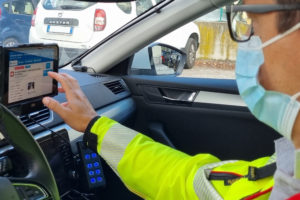The satellite-enabled emergency response system that could make a life-saving difference

The COVID-19 pandemic has challenged ambulance services like never before. First RESPonse was created to help professionals respond to emergency calls more rapidly through enhanced technology. With support by ESA Space Solutions, the system developed in a Demonstration Project streamlined communication and information sharing throughout the chain of response and reduced call-to-hospital times for patients by up to 17%.
During the worst months of the COVID-19 pandemic, emergency call centres experienced extremely high rates of urgent medical calls. Coordination of the ambulance response was challenging and made more complex by the changing landscape of medical resources; hospitals were filling up, and temporary emergency facilities were opening.
The First RESPonse (First Rapid Emergency System against Pandemic) project launched in Italy in July 2020, with the aim to improve coordination of the entire process of a medical emergency request: from a patient’s distress call to the point of hospitalisation.
The project brought together two major players in European emergency service software and telecommunications: GINA Software and Beta 80. Forming a new consortium, the companies achieved complete integration of their products and – supported by ESA – incorporated space technology for enhanced geolocation accuracy and communication coverage.
Digital links for a faster chain
First RESPonse digitally connects each link in the emergency chain of response. It begins with an app on a citizen’s smartphone, through which they can call for help, see when help has been dispatched and when it is due to arrive. Ambulance dispatchers in the call centre have a constant digital connection to their crews via a workstation. They can keep them updated on the scene and patient’s condition, and the status of the nearest hospital facilities. First responders have a tablet through which they receive up-to-date information about the patient, automatic SatNav to their location and can video consult with a doctor from the field. They can also scan the patient’s ID card so that receiving hospitals know who is coming in, as well as seeing when they are expected.
The system was piloted by selected ambulance services in Italy and the Czech Republic and used in almost 9,000 incidents. In this pilot project, First RESPonse accelerated the pre-hospital chain by between 12 and 17%.
Arnaud Runge, Medical Engineer at ESA said: “In a medical emergency every minute counts. Cutting the time it takes an ambulance to reach a critically ill patient, and to get them to hospital, can make a life-saving difference. We’re proud to have enhanced First RESPonse with space technology.”
From pandemic to systemic
Following the successful completion of the pilot, First RESPonse is being promoted to emergency services more widely in Italy and the Czech Republic – where GINA and Beta 80 have most of their customers – and beyond.
Martin Ingr from GINA said: “The products and services that were created during the project are aimed to remain sustainable also after the pandemic is overcome. Our goal is that the problems solved through the First RESPonse project become part of the standard operation procedure. The system can be used again against this or other pandemics, during the response to disasters such as earthquakes, as well as improving daily operations of emergency services.”
[Source: ESA]
